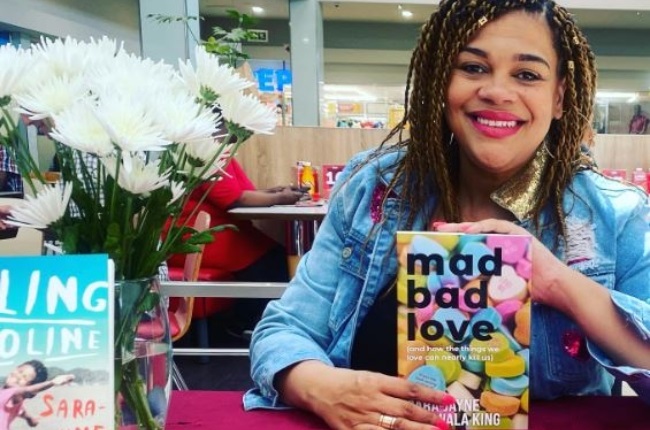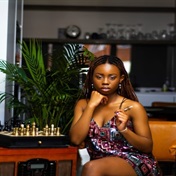
“I’m surprised by my ability to adult most days.”
This, coming from a bestselling author whose just released a second book – written in just six months, is hard to believe but strangely comforting.
Aren’t we all winging adulting? Sara-Jayne (SJ) King Matlala’s honesty is refreshing. And the fact that she’s just uttered these words barely 30 seconds into our Zoom interview is a good sign that only realness and frankness will be served here, with a dash of side-splitting humour and plenty of self-reflection – much like the story she tells in her second memoir, Mad Bad Love: And How The Things We Love Can Nearly Kill Us.
Mad Bad Love is published by Melinda Ferguson Books, and it started out as SJ sharing stories about her relationship that had Melinda constantly saying, “You need to write a book about that!”
“I always knew that I wanted to write another book (after Killing Karoline). In fact, the day that I handed my final manuscript to the publisher, I said to her, ‘I’m gonna start writing the next one. But I didn’t do that at all and got on with the rest of my life.
“Writing a book is quite an addictive thing and the handing over of it for public consumption is quite a strange thing as well, so I was in the momentum of writing. But I didn’t keep writing, otherwise there would’ve been a book years ago!”
Whereas Killing Karoline is about growing up with adoption trauma and a lost identity in the UK after being born to a white mother and black father in apartheid SA and, six weeks later, given up for adoption, Mad Bad Love is about her addiction to love and her futile attempts to build happily-ever-after with her long-term partner, Enver, who is in active addiction.
Read more | BOOK EXTRACT | Gqimm Shelele: The Robert Marawa Story
Does she believe in happily-ever-after? “I don’t. I believe in healing-ever-after and doing-the-work-ever-after. Happily-ever-after is an absolute bullsh*t notion that we get sucked into by watching too much television and reading too many awful books about love stories . . . But that doesn’t mean that I’m this miserable cow who’s just waiting for the next disaster to happen,” she says with a hearty laugh. “But it is the stuff of Disney, isn’t it? Not the truth.”
Initially, she was diagnosed with bipolar disorder 15 years ago but was never really comfortable with that diagnosis. Years later, she met a psychiatrist who explained that although bipolar disorder and borderline personality disorder may present in similar ways, the latter has more to do with attachment disorder and childhood trauma. This made a lot of sense to SJ, given her childhood traumas and infant rejection.
Although she missed out on being raised by her biological dad and getting to know her siblings, they are as close as they can be since meeting 35 years after she was classified as white at birth, then given to a couple in the UK in 1980. Upon her return to apartheid SA, her mother told people her newborn, Karoline, was dead. It was thanks to the power and reach of social media that Sarah Jane (who changed the spelling of her name to Sara-Jayne) found her dad and siblings. But happily ever after, as she says, is the stuff of fiction and not real life.
In Mad Bad Love, she writes about her 15-year, on-off relationship that tested the limits of her resilience. She’s in The Clinic when we meet her, falling hopelessly for Enver, a man who loves her back ferociously but is battling his own demon of addiction. The memoir, however, is more an unflinching reflection on self – what makes SJ fall for people with addictions, why she’s so determined to save people wo have no will or strength to save themselves, and what becoming a mother in the midst of it all means – than about Enver.
She started writing the book in November 2021 at Melinda’s urging. “She said to me, ‘Look, if you’re going to publish the book next year then I need it in by the first of May.’ When you have kids, you don’t quite have the freedom to procrastinate – so much as stuff needs to be done – so I needed to schedule time to write.”
Six months later, she was done writing a book that anyone who has ever loved or is in love or considering being in love should read. Basically all of us. Not because all relationships are the same, but simply because SJ’s honesty about how and why she loved Enver makes the reader reflect on their own relationships with others and reality in a new light. This is because addiction is, as many have concluded, not just about substances, sex or any of those great ‘sins’, but about our relationship to reality. How willing are we to confront the uncomfortable truths about what we are trying to escape from or find comfort in?
Very honest, is SJ’s answer. She would choose her path and journey over and over again rather than live in denial about the fact that we are all addicts – to something – then deal with it. One of the ways she deals with this awareness is weekly therapy. “Therapy bankrupts me, but I choose to do it,” she says with a chortle.
In writing her previous book she worried about how it would make her adoptive mother feel. This time it was Enver who might have his feelings hurt, but she is experienced enough as a journalist and author to know that “when you write memoir and other people are involved, it’s always going to be difficult because I haven’t gone through life loving everyone and getting along with everyone I’ve met”. She’s open in Mad Bad Love about her feelings of hurt and rejection when, soon after discovering Enver has been lying about quitting heroine, she reaches out to his family for support during her pregnancy. She’s met with cold, unsympathetic silence.
“With my dad and my siblings, I don’t worry about what they’re going to think when they read my book because we don’t have a difficult relationship. It’s different with Enver because he is the father of my daughter; some of the stuff that I write about in the book, which happened, was hectic; it’s difficult with him because also no-one likes to have their bad behaviour exposed. But I knew that was never going to stop me from writing ever, ever.
“I guess it’s difficult for him but he’s also in a process of recovery, like we all are, and he knows what he did. But also, I think in this book particularly, I also shine a light on my own sh*t. It’s not just ‘Enver did this to me for 15 years.’ It also looks at my own stuff and my own behaviour. There’s moments I wasn’t exactly covering myself in glory. I’ve had to own that.
“I can’t bear reading a memoir that isn’t [introspective]. It doesn’t happen very often but there’ve been a couple of memoirs that I read and thought, ‘This would’ve been really good if you’d painted yourself in a true light; if you hadn’t spent so much effort trying to paint yourself as this amazing, untouchable person.’
“Even when bad things happen to us and others behave appallingly towards us, no one can sit there and honestly say, ‘I’ve been completely blameless in every single event that’s ever happened in my life.’ Also, having done Killing Karoline, I like to think that I am able to tell my story and write the other people who may have been involved in that story without saying unnecessary things about them.
“Like, with Enver for example, the Enver that I write is 1% of who he is. I write about how he related to me and not about who he is.”
Read more | Onke Mazibuko on writing, teen suicide, being a black male psychologist and the therapeutic journey
The memoir genre seems to choose her rather than the other way around. “It really does,” the 42-year-old award-winning broadcaster agrees.
“And I keep saying this: I really don’t want anything to happen in my life again that requires me to write another memoir.
“If I write another memoir, I want it to be when I’m 60 or something and I’m reflecting back and my grandkids are grown up. I want it to be something really tame. And I don’t want it to be: ‘and then my heart got ripped out’.
“I just don’t want anymore life experience that requires me to write another memoir like this!”
When she hints that she’d like her next book to be a fiction work, the thought immediately elicits enthusiasm because her gift for prose is so unique.
“It’s funny you say that,” she agrees, “because my writing is . . .” she pauses to find the right adjective. “I don’t know if you can say ‘poetic’? Yes, I do think it’s poetic, even though there is no rule that says you can’t write memoir poetically.
“For me the joy of the writing is the joy of the language. It’s not just ‘and then he said that, and then I said that, and then I did that’.”
- Weekly therapy
- Surrounding myself with similarly minded people – people in recovery
- I cut toxic people out of my life
- I’ve started to get better at boundaries
- I make a conscious effort to make room for joy



















